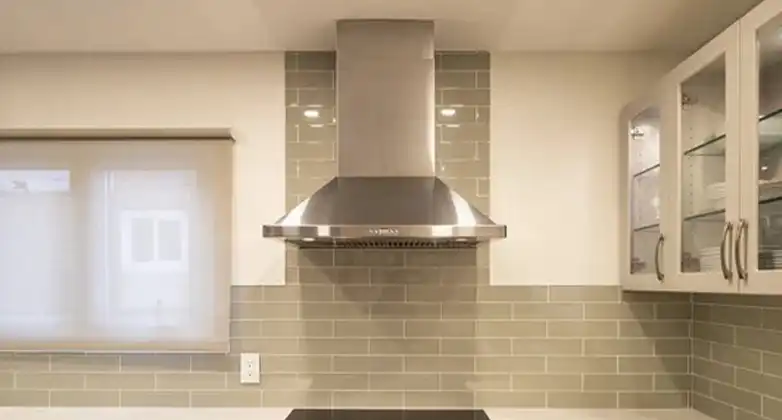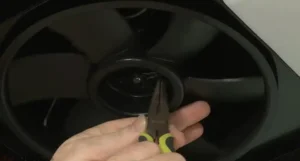The vent hood is a vital component of your kitchen. However, it can cause nuances too, like introducing a new source of noise to your home. So, If you can hear the rain in the vent hood of your new home and wondering if it’s normal, this article is for you.
Yes, you can hear the rain in a vent hood. However, this phenomenon is not uncommon and can be addressed with proper installation and maintenance.
In this article, we will explain why you can hear the rain in a vent hood, whether it is normal, how to minimize it, and provide installation tips to help you enjoy a quieter kitchen environment.

Why You Can Hear Rain in Your Vent Hood?
So, it’s not unnatural to hear the rain in your vent hood. But why is this the case?
Vent Hood Design
The sound of rain in a vent hood primarily stems from its design. Vent hoods are typically equipped with metal or plastic vents that act as conduits for airflow. When raindrops fall onto these surfaces, they create a distinct noise due to the material’s resonance. The larger the raindrops and the more intense the rain, the louder the noise can become.
Water Droplets Impacting
Another reason you can hear the rain in a vent hood is the impact of water droplets on the surfaces inside the hood. As raindrops hit the metal or plastic parts of the vent, they produce a tapping or pinging sound that can resonate throughout the vent system and be heard inside your kitchen.
Sound Amplification
Vent hoods are designed to expel air and odors from your kitchen efficiently. However, this same airflow can amplify the sound of rain. The rushing air can create a vacuum effect, causing noise from the raindrops hitting the vents to be pulled into your kitchen.
Is It Normal?
Yes, hearing rain in a vent hood is a common occurrence, and it is considered normal. The materials used in vent hoods are often thin and lightweight, making them more susceptible to transmitting sound. Moreover, the vent system is designed to handle air, not necessarily to provide sound insulation. Therefore, it is natural for rain sounds to be audible during inclement weather.
How to Minimize Rain Sound Through a Vent Hood?
While it may be normal to hear rain in a vent hood, you can take steps to minimize this noise and enjoy a quieter kitchen environment.
Choose the Right Location
During the installation of your vent hood, consider the location carefully. Placing it in an area protected from direct exposure to rain, such as under an overhang or canopy, can significantly reduce the impact of rain noise.
Install a Rain Guard
A rain guard, also known as a rain cap or rain hood, is a device designed to shield the vent hood from direct exposure to rain. It acts as a barrier, preventing raindrops from falling directly onto the vent surfaces. Installing a rain guard can effectively reduce rain-related noise.
Check and Maintain Your Vent Hood
Regular maintenance is crucial to ensuring your vent hood functions optimally. Keep the vent and exhaust system clean and free of debris, which can exacerbate noise issues. Inspect the hood for any loose or damaged components and repair or replace them as needed.
Insulate the Vent
Applying insulation around the vent ducts and inside the vent hood can help absorb and dampen sound. Materials like acoustic foam or fiberglass insulation can be used for this purpose. Ensure that the insulation does not obstruct the vent’s airflow.
Consider Soundproofing
For those bothered by persistent noise from their vent hood, soundproofing the kitchen area can be a more comprehensive solution. This may involve adding acoustic panels to the walls or ceiling and using noise-reducing materials for kitchen cabinets and countertops.
Installation Tips to Minimize Rain Noise
Proper installation plays a crucial role in minimizing rain noise in your vent hood. Follow these installation tips to ensure the best results:
Hire a Professional
It’s advisable to hire a qualified professional for vent hood installation. They can assess your kitchen’s layout, choose the most suitable location, and ensure proper ventilation and ductwork.
Use High-Quality Vents
Invest in high-quality vents made of thicker materials. These vents are less prone to resonating and amplifying rain noise.
Slope the Ducts
When installing the ducts that connect the vent hood to the exterior, ensure they have a slight slope downward. This slope will help water drain away from the vent rather than pooling inside it.
Secure All Components
Make sure all components of the vent hood, including the ducts, vents, and rain guards, are securely fastened. Loose parts can rattle and make noise during rainstorms.
Seal Gaps and Joints
Use appropriate sealants to seal any gaps or joints in the vent system. This will prevent water from seeping into the ducts and reduce noise caused by water hitting the interior surfaces.
People Also Ask on the Internet
Can I completely eliminate rain noise in my vent hood?
While you can minimize rain noise significantly, it may be challenging to completely eliminate it due to the inherent design of vent hoods. However, with the right installation techniques and maintenance, you can enjoy a much quieter kitchen environment during rain showers.
Do all vent hoods produce the same level of rain noise?
The level of rain noise can vary depending on the design and materials of the vent hood. High-quality hoods made from thicker materials tend to produce less noise than cheaper, thinner options.
Is rain noise in a vent hood a sign of a problem with my ventilation system?
Not necessarily. Rain noise is a common occurrence and is not indicative of a problem with your ventilation system. However, if you experience unusual noises or issues during dry weather, it’s advisable to have your system inspected for potential problems.
Can I install a rain guard after my vent hood is already in place?
Yes, you can install a rain guard at any time. However, it’s often easier and more effective to include it during the initial installation of the vent hood. Retrofitting a rain guard may require some adjustments to your existing setup.
Parting Notes
Hearing rain in a vent hood is a normal occurrence due to the design and materials used in these systems. However, by following proper installation techniques, regular maintenance, and considering additional measures like rain guards and soundproofing, you can significantly reduce rain-related noise and enjoy a quieter kitchen environment even during stormy weather.


![Read more about the article [Explored] How Loud are ZLINE Range Hoods?](https://kitchenhoodcare.com/wp-content/uploads/2023/10/How-Loud-are-ZLINE-Range-Hoods-300x161.webp)